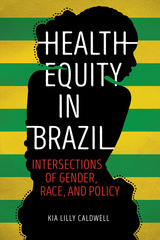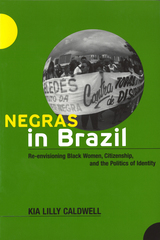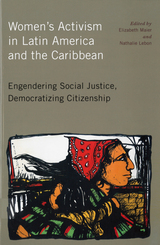3 books about Caldwell, Kia Lilly

Health Equity in Brazil
Intersections of Gender, Race, and Policy
Kia Lilly Caldwell
University of Illinois Press, 2017
Brazil's leadership role in the fight against HIV has brought its public health system widespread praise. But the nation still faces serious health challenges and inequities. Though home to the world's second largest African-descendant population, Brazil failed to address many of its public health issues that disproportionately impact Afro-Brazilian women and men. Kia Lilly Caldwell draws on twenty years of engagement with activists, issues, and policy initiatives to document how the country's feminist health movement and black women's movement have fought for much-needed changes in women's health. Merging ethnography with a historical analysis of policies and programs, Caldwell offers a close examination of institutional and structural factors that have impacted the quest for gender and racial health equity in Brazil. As she shows, activists have played an essential role in policy development in areas ranging from maternal mortality to female sterilization. Caldwell's insightful portrait of the public health system also details how its weaknesses contribute to ongoing failures and challenges while also imperiling the advances that have been made.
[more]

Negras in Brazil
Re-envisioning Black Women, Citizenship, and the Politics of Identity
Caldwell, Kia Lilly
Rutgers University Press, 2006
For most of the twentieth century, Brazil was widely regarded as a "racial democracy"-a country untainted by the scourge of racism and prejudice. In recent decades, however, this image has been severely critiqued, with a growing number of studies highlighting persistent and deep-seated patterns of racial discrimination and inequality. Yet, recent work on race and racism has rarely considered gender as part of its analysis.
In Negras in Brazil, Kia Lilly Caldwell examines the life experiences of Afro-Brazilian women whose stories have until now been largely untold. This pathbreaking study analyzes the links between race and gender and broader processes of social, economic, and political exclusion. Drawing on ethnographic research with social movement organizations and thirty-five life history interviews, Caldwell explores the everyday struggles Afro-Brazilian women face in their efforts to achieve equal rights and full citizenship. She also shows how the black women's movement, which has emerged in recent decades, has sought to challenge racial and gender discrimination in Brazil. While proposing a broader view of citizenship that includes domains such as popular culture and the body, Negras in Brazil highlights the continuing relevance of identity politics for members of racially marginalized communities. Providing new insights into black women's social activism and a gendered perspective on Brazilian racial dynamics, this book will be of interest to students and scholars of Latin American Studies, African diaspora studies, women's studies, politics, and cultural anthropology.
In Negras in Brazil, Kia Lilly Caldwell examines the life experiences of Afro-Brazilian women whose stories have until now been largely untold. This pathbreaking study analyzes the links between race and gender and broader processes of social, economic, and political exclusion. Drawing on ethnographic research with social movement organizations and thirty-five life history interviews, Caldwell explores the everyday struggles Afro-Brazilian women face in their efforts to achieve equal rights and full citizenship. She also shows how the black women's movement, which has emerged in recent decades, has sought to challenge racial and gender discrimination in Brazil. While proposing a broader view of citizenship that includes domains such as popular culture and the body, Negras in Brazil highlights the continuing relevance of identity politics for members of racially marginalized communities. Providing new insights into black women's social activism and a gendered perspective on Brazilian racial dynamics, this book will be of interest to students and scholars of Latin American Studies, African diaspora studies, women's studies, politics, and cultural anthropology.
[more]

Women's Activism in Latin America and the Caribbean
Engendering Social Justice, Democratizing Citizenship
Edited and with an introduction by Elizabeth Maier and Nathalie Lebon
Rutgers University Press, 2010
Women's Activism in Latin America and the Caribbean brings together a group of interdisciplinary scholars who analyze and document the diversity, vibrancy, and effectiveness of women's experiences and organizing in Latin America and the Caribbean during the past four decades. Most of the expressions of collective agency are analyzed in this book within the context of the neoliberal model of globalization that has seriously affected most Latin American and Caribbean women's lives in multiple ways. Contributors explore the emergence of the area's feminist movement, dictatorships of the 1970s, the Central American uprisings, the urban, grassroots organizing for better living conditions, and finally, the turn toward public policy and formal political involvement and the alternative globalization movement. Geared toward bridging cultural realities, this volume represents women's transformations, challenges, and hopes, while considering the analytical tools needed to dissect the realities, understand the alternatives, and promote gender democracy.
[more]
READERS
Browse our collection.
PUBLISHERS
See BiblioVault's publisher services.
STUDENT SERVICES
Files for college accessibility offices.
UChicago Accessibility Resources
home | accessibility | search | about | contact us
BiblioVault ® 2001 - 2025
The University of Chicago Press









